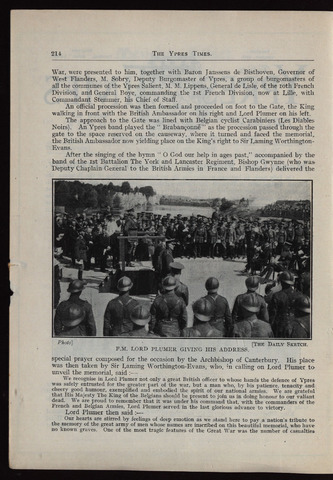214
The Ypres Times.
War, were presented to him, together with Baron Janssens de Bisthoven, Governor of
West Flanders, M. Sobry, Deputy Burgomaster of Ypres, a group of burgomasters of
all the communes of the Ypres Salient, M. M. Lippens, General de Lisle, of the ioth French
Division, and General Boye, commanding the 1st French Division, now at Lille, with
Commandant Stemmer, his Chief of Staff.
An official procession was then formed and proceeded on foot to the Gate, the King
walking in front with the British Ambassador on his right and Lord Plumer on his left.
The approach to the Gate was lined with Belgian cyclist Carabiniers (Les Diables
Noirs). An Ypres band played the BrabaiKjonné as the procession passed through the
gate to the space reserved on the causeway, where it turned and faced the memorial,,
the British Ambassador now yielding place on the King's right to Sir Laming Worthington-
Evans.
After the singing of the hymn O God our help in ages past," accompanied by the
band of the 1st Battalion The York and Lancaster Regiment, Bishop Gwvnne (who was
Deputy Chaplain-General to the British Armies in France and Flanders) delivered the
special prayer composed for the occasion by the Archbishop of Canterbury. His place
was then taken by Sir Laming Worthington-Evans, who, in calling on Lord Plumer to
unveil the memorial, said
We recognise in I,ord Plumer not only a great British officer to whose hands the defence of Ypres
was safely entrusted for the greater part of the war, but a man who, by his patience, tenacity and
cheery good humour, exemplified and embodied the spirit of our national armies. We are grateful
that His Majesty The King of the Belgians should be present to join us in doing honour to our valiant
dead. We are proud to remember that it was under his command that, with the commanders of the
French and Belgian Armies, Lord Plumer served in the last glorious advance to victory.
Lord Plumer then said
Our hearts are stirred by feelings of deep emotion as we stand here to pay a nation's tribute to
the memory of the great army of men whose names are inscribed on this beautiful memorial, who have
no known graves. One of the most tragic features of the Great War was the number of casualties
Photo
IThe Daily Sketch.
F.M. LORD PLUMER GIVING HIS ADDRESS.

